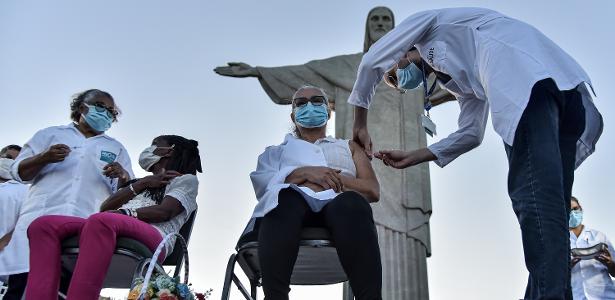
[ad_1]
The first two vaccinated people in Rio de Janeiro received the immunizer shortly before 6:30 pm today (18) in a symbolic act in Christ the Redeemer. The start of vaccination in the state, which coincides with the return to the death rate last June, was marked by crowding and a delay in the arrival of vaccines.
The first vaccine was Dulcineia da Silva Lopes, 59, who works on the front line against covid-19. She is a nursing technician at the Ronaldo Gazolla Municipal Hospital, a reference unit against the disease in the capital of Rio de Janeiro. A resident of the Cristo Redentor shelter, Terezinha da Conceição, 80, was the second person to receive immunization in the state.
Both are part of the priority groups that will receive the first batch of CoronaVac.
Terezinha was in a situation of social vulnerability and was taken to the shelter in 2015 after the Civil Defense demolished her residence. She received the vaccine from Adélia Maria dos Santos, who has been a municipal public health worker since 1979 and was one of the founders of the city’s Immunization Program.
Our main option at this time is vaccination. I have worked with vaccines for many years and we know how the vaccine has stopped several epidemics. Like polio, measles. These were the things that most contaminated the children, with deaths and consequences […] Without fear.
Adélia Maria dos Santos, nurse who started vaccination in Rio
In the capital of Rio de Janeiro, the first batch of the immunizer will be applied in a period of four days; According to the municipal plan, 110,470 people must be vaccinated in the city of Rio between January 19 and 23.
The state of Rio will vaccinate 232,521 people with the first batch; In total, the state government will receive 487,520 doses of the immunizer.
The target audience for the 1st stage of vaccination are:
- Health professionals who directly care for patients with covid-19 (CTI, a room that treats SARS – Severe Acute Respiratory Syndrome – and emergencies)
- Professionals involved in the covid-19 vaccination campaign
- Long-term care workers
- Elderly (aged 60 and over) living in long-stay institutions
- People with disabilities from 18 years old who live in inclusive shelters / residences
- Indigenous population living on indigenous lands
[ad_2]